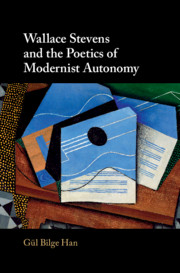Book contents
- Wallace Stevens and the Poetics of Modernist Autonomy
- Wallace Stevens and the Poetics of Modernist Autonomy
- Copyright page
- Epigraph
- Dedication
- Contents
- Acknowledgments
- Abbreviations
- Introduction
- Chapter 1 The Politics of Aesthetic Separation
- Chapter 2 Spaces of Autonomy
- Chapter 3 Community and Autonomy
- Chapter 4 Autonomy and Philosophy
- Coda
- Bibliography
- Index
Introduction
Published online by Cambridge University Press: 17 June 2019
- Wallace Stevens and the Poetics of Modernist Autonomy
- Wallace Stevens and the Poetics of Modernist Autonomy
- Copyright page
- Epigraph
- Dedication
- Contents
- Acknowledgments
- Abbreviations
- Introduction
- Chapter 1 The Politics of Aesthetic Separation
- Chapter 2 Spaces of Autonomy
- Chapter 3 Community and Autonomy
- Chapter 4 Autonomy and Philosophy
- Coda
- Bibliography
- Index
Summary
The introductory chapter provides an overview of the book’s key analytical and theoretical concerns about Wallace Stevens, aesthetic autonomy, and modernism. It introduces the book’s main objective to show how Stevens’ poetic commitment to autonomy does not simply assert a mode of aesthetic enclosure, but serves to model and develop the forms in which the relationship between the poetry and the wider sociohistorical and cultural matrix is expressed. The Introduction positions the book’s main claims in relation to Stevens scholarship and modernist studies, and highlights the significance of the problem of autonomy to Stevens’ poetry of the 1930s and 1940s. It also provides a critical account of the major theoretical frameworks developed around aesthetic autonomy and its current assessments in modernist studies. The account given of aesthetic autonomy and the review of Stevens criticism lay out the foundations for the inquiry and the critical approach the book takes.
Keywords
- Type
- Chapter
- Information
- Publisher: Cambridge University PressPrint publication year: 2019

